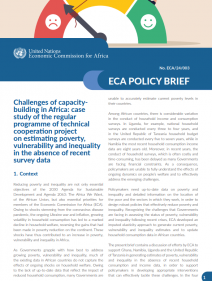In response to the need for countries to generate timely and frequent data on poverty, vulnerability and inequality, ECA developed an imputed elasticity methodology to update household consumption data using an imputed elasticity approach. The approach involves applying the elasticity of consumption and national account information to update household income or consumption data and imputing the updated aggregate consumption into the household consumption survey. With the updated consumption data, a country’s current estimates of poverty, vulnerability and inequality are generated. Through the imputed elasticity approach, by which the national poverty line is used to generate national estimates, poverty can be predicted on the basis of actual consumption, and the inflation effect on households can be captured on the basis of the consumer price index. Assumptions underlying the approach are that gross domestic product growth and inflation have differential impacts across income groups and individuals, respectively. Besides updating the national poverty line, the methodology also allows for the generation of annual poverty estimates and trends using macro data and the estimation of the poverty gap and the severity of poverty. In addition, it allows for the estimation of poverty and inequality measures for different groups, such as men and women, and the disaggregated assessment of poverty by region, age and education. Its other advantages include the ability to update household consumption survey data and the decomposition of poverty drivers. The methodology, which can be used to generate timely and frequent estimates of poverty that are relatively close to the actual poverty level, is robust, as it can help to produce estimates in the absence of household data from a recent household survey.
Share this:
Release Date:
7 April, 2025
© United Nations Economic Commission for Africa

